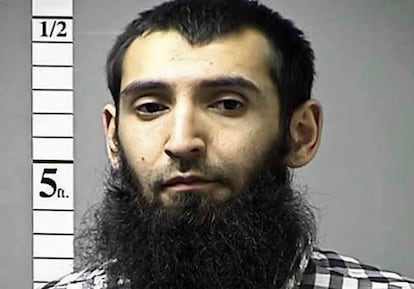Divided jury means no death penalty for NYC bike path killer
The same jury convicted Saipov in January of 28 charges including murder in aid of racketeering and supporting a terrorist organization

A split among jurors means there will be no death penalty for an Islamic extremist who maniacally raced a truck along a popular New York City bike path, killing eight people and maiming others. The decision means Sayfullo Saipov, 35, an Uzbekistan citizen who lived in New Jersey, gets an automatic sentence of life in prison without the possibility of parole in the October 2017 attack. Jurors told the judge Monday that they were unable to reach the unanimous verdict required for a death sentence.
The sentencing was the culmination of a trial that featured emotional testimony from survivors of the attack and relatives of the five tourists from Argentina, two Americans and a Belgian woman who were killed.
The same jury convicted Saipov in January of 28 charges including murder in aid of racketeering and supporting a terrorist organization.
It returned last month for a penalty phase to decide whether he should be sentenced to death or spend the rest of his life at a maximum security prison in Florence, Colorado.
Over several days, prosecutors argued for the harshest punishment. Some of Saipov’s relatives testified that they still loved him and hoped he would eventually realize the evil of his act.
Saipov’s responsibility for the killings was never in doubt. His lawyers conceded he steered his rental truck on a sunny day onto a crowded lower Manhattan bike path along the Hudson River in a bid for martyrdom.
Prosecutors said he sped up, trying to kill as many people as he could. His plan to drive to the Brooklyn Bridge and kill even more people was thwarted when he crashed into a school bus. He left the wrecked vehicle shouting “God is great” in Arabic, wielding paintball and pellet guns, before being shot by a police officer.
Prosecutors said he smiled as he asked that an Islamic State group flag be posted on the wall of his hospital room.
While some U.S. states send prisoners to death row with regularity, that kind of outcome is extremely rare in New York, which no longer has capital punishment and last executed a prisoner in 1963.
A day after the attack, then-President Donald Trump tweeted that Saipov “SHOULD GET DEATH PENALTY!”
Biden pledged during his campaign to work toward abolishing federal capital punishment, and no federal executions have taken place since he took office. U.S. Attorney General Merrick Garland imposed a moratorium on executions for federal crimes in 2021, but has allowed U.S. prosecutors to continue advocating for capital punishment in cases inherited from previous administrations.
During his trial, Saipov seemed moved by testimony from his father and sisters. Otherwise he sat quietly, his shoulders slumped, as he listened through headphones to the testimony of victims, including a woman from Belgium who lost her legs, and her husband, who needed brain surgery because of the attack.
Saipov turned down the chance to testify at trial. But during his 2019 pretrial hearing, he lectured Judge Vernon S. Broderick about the American legal system, insisting that he could not be judged for eight deaths when " thousands and thousands of Muslims are dying all over the world.”
During closing arguments in the penalty phase on Tuesday, lawyers made a final appeal to jurors.
Assistant U.S. Attorney Amanda Houle called for the death penalty for Saipov’s “unremorseful slaughter of innocent civilians.”
Defense attorney David Patton urged a life sentence, saying his client then will “die in prison in obscurity, not as a martyr, not as a hero to anyone.”
Saipov came to the U.S. legally from Uzbekistan in 2010 and lived in Ohio and Florida before moving to Paterson, New Jersey.
His death penalty trial was the first of its kind in New York in a decade.
In 2007 and again in 2013, federal juries in Brooklyn sentenced to death a man who killed two New York police detectives, but both sentences were reversed on appeal before a judge ruled the killer was intellectually disabled.
In 2001, a Manhattan federal jury rejected the death penalty for two men convicted in the deadly bombings of two U.S. embassies in Africa after their lawyers argued against making the defendants into martyrs.
The last time a person was executed for a federal crime in New York was in 1954.
Sign up for our weekly newsletter to get more English-language news coverage from EL PAÍS USA Edition
Tu suscripción se está usando en otro dispositivo
¿Quieres añadir otro usuario a tu suscripción?
Si continúas leyendo en este dispositivo, no se podrá leer en el otro.
FlechaTu suscripción se está usando en otro dispositivo y solo puedes acceder a EL PAÍS desde un dispositivo a la vez.
Si quieres compartir tu cuenta, cambia tu suscripción a la modalidad Premium, así podrás añadir otro usuario. Cada uno accederá con su propia cuenta de email, lo que os permitirá personalizar vuestra experiencia en EL PAÍS.
¿Tienes una suscripción de empresa? Accede aquí para contratar más cuentas.
En el caso de no saber quién está usando tu cuenta, te recomendamos cambiar tu contraseña aquí.
Si decides continuar compartiendo tu cuenta, este mensaje se mostrará en tu dispositivo y en el de la otra persona que está usando tu cuenta de forma indefinida, afectando a tu experiencia de lectura. Puedes consultar aquí los términos y condiciones de la suscripción digital.








































